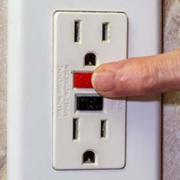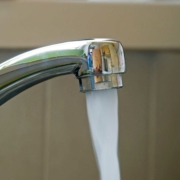Electrical safety is a critical concern in any home, and one of the common issues in older homes is the absence of a ground wire. Many homes built before the 1960s were wired with only two-prong outlets, lacking a dedicated grounding conductor. While upgrading an entire electrical system to include grounding can be costly and invasive, Ground Fault Circuit Interrupters (GFCIs) offer a practical and code-compliant alternative to enhance electrical safety. In this blog, we’ll explore how GFCI outlets work, why they are an acceptable solution for ungrounded systems, and best practices for their installation.
Understanding the Purpose of a Ground Wire
A ground wire is a critical component of modern electrical systems. It provides a safe path for excess electricity to dissipate into the earth in the event of a fault. This reduces the risk of electric shock and prevents damage to appliances. Without a ground wire, any electrical fault—such as a short circuit—can create a hazardous situation where metal parts of appliances or fixtures become live with electricity.
How GFCIs Outlets Work
GFCI outlets enhance electrical safety by monitoring the flow of electricity between the hot and neutral wires. If the device detects any imbalance—meaning some current is leaking, potentially through a person—it rapidly shuts off power to prevent electric shock. Unlike a traditional grounding system, which directs stray voltage away from a user, GFCI outlets actively break the circuit the moment it detects an anomaly, typically in as little as 1/40th of a second.
Why GFCI Outlets Are an Acceptable Alternative to Grounding
The National Electrical Code (NEC) allows GFCI outlets as a solution for ungrounded outlets, provided they are properly installed and labeled. While a GFCI does not create a ground, it significantly reduces the risk of electric shock, making it a safe and cost-effective option in older homes.
Benefits of using GFCIs in ungrounded systems include:
- Shock Prevention: GFCI outlets trip when they detect a ground fault, reducing the risk of serious injury.
- Code Compliance: NEC permits the use of GFCI protection in lieu of a ground wire, provided the outlets are labeled as “No Equipment Ground.”
- Ease of Installation: Upgrading an entire home’s wiring system to include grounding can be costly. Installing GFCIs is a much more affordable and less invasive option.
Best Practices for Installing GFCI Outlets in an Ungrounded System
If your home lacks a ground wire, installing GFCIs is a straightforward process. Remember, while it’s a straightforward process we understand that many people are uncomfortable working around electricity. There’s no shame in hiring an electrician.
If you are going to do it yourself it’s important to follow these best practices:
- Identify Ungrounded Outlets: If your outlets only have two slots and no round ground hole, they are likely ungrounded.
- Replace the First Outlet in a Circuit: A single GFCI outlet can protect all downstream outlets on the same circuit. Installing a GFCI at the first outlet in a series provides protection for everything connected beyond it.
- Use Proper Labeling: When installing GFCIs in ungrounded systems, outlets must be labeled “No Equipment Ground.” This informs users that although the outlet has shock protection, it does not provide grounding for surge protectors or three-pronged appliances.
- Avoid Relying on Three-Prong Adapters: Simply plugging a three-pronged appliance into a GFCI outlet does not create an actual ground. The device is still ungrounded, even though it has some level of safety protection from the GFCI.
- Test Regularly: GFCI outlets come with test and reset buttons. It’s important to test them monthly to ensure they are functioning properly.
Limitations of GFCIs in Ungrounded Systems
While GFCI outlets significantly improve safety, they do have some limitations:
- No Surge Protection: Ungrounded outlets cannot properly support surge protectors. If you have sensitive electronics, consider other grounding solutions.
- Not a Full Replacement for Grounding: While GFCIs protect against electric shock, they do not provide a pathway for fault currents like a true ground wire does.
- Appliance Compatibility: Some appliances with three-prong plugs require grounding to operate safely. In these cases, a proper ground should be installed.
Conclusion
If your home has ungrounded outlets, installing GFCI outlets are an excellent way to improve electrical safety without the high cost of rewiring your entire home. While they don’t provide grounding, they effectively prevent electrical shocks and comply with modern safety codes. By following proper installation and labeling practices, homeowners can ensure they are taking a proactive approach to electrical safety in older homes.
For those considering electrical upgrades, consulting a licensed electrician or home inspector can provide additional insights on the best solutions for your home’s unique needs.




